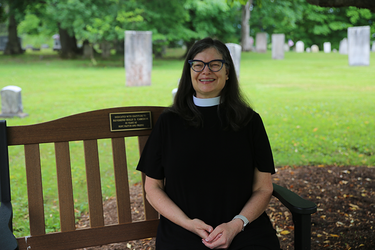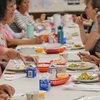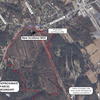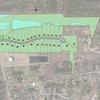Pastor Holly Cameron says we are born with a desire to be connected to one another
NEW SCOTLAND — Holly Cameron loves her church.
She has been the pastor of the New Scotland Presbyterian Church for 25 years.
“The church is a place to try to understand what is something larger than myself, both within that community of people, and with God,” she says in this week’s Enterprise podcast.
She describes her becoming a pastor as a journey.
Cameron grew up in Alabama, in a time and place where women weren’t ministers. That time is not necessarily distant as this month delegates to the Southern Baptist Convention’s annual meeting voted to amend their constitution to say their churches must have “only men as any kind of pastor or elder as qualified by Scripture.”
Cameron’s parents are from Wisconsin and moved south because her father, an electrical engineer, was part of “the great space race in the mid-sixties …. He was part of that whole conglomeration that was working to put people on the moon,” said Cameron.
Her mother took her and her sister to church every week and that church community became like an extended family in the absence of the Cameron’s real family in Wisconsin.
Church was part of Cameron’s life in college, too, where she majored in accounting and, after graduation, started working as a certified public accountant.
She found accounting interesting for about the first year, she said, but then came to realize, if she had “to do this over and over for the next 40 years, I wasn’t really sure that was what was going to feed my soul.”
She remembers standing in a hallway as her minister at the time was going through his mail. “I think as a joke he handed me a piece of mail that was about an exploratory weekend at Louisville Seminary.”
Without telling anyone, she decided to go and attended the lectures. “I just had a very strong feeling, as I was sitting there, listening to this, I thought, ‘This is what I’m going to do.’”
There was a memorable moment when one of the professors said, “The thing about ministry is you are with people in some of the most important parts of their lives. You are there when babies are born and baptized and when people are dying and when people are getting married and so you really have to love people. You just have to be a people person and, if you’re not, you should really just go do something like become a CPA.”
Everybody in the room fell silent since those, besides the professor, knew what Cameron did for a living.
“It was very funny to me because, when I was an accountant, I worked as an auditor and that meant we had to go into different companies and get their help to do our job … You have to have people skills as an accountant, too,” said Cameron.
She felt compelled to be a minister although, she said, “I wasn’t entirely sure because there weren’t a lot of women.”
And, then beginning her journey, she came under care of a committee in Birmingham, Alabama. “They said to me, ‘We’re going to approve you beginning this process but we don’t think you’ll ever get a job.’ And I said, ‘Why is that?’ And they said, ‘Because you’re a woman and no one wants a woman minister.’ And I thought, ‘I won’t be coming here to look for a job.’”
So Cameron went to seminary in Boston and loved everything about it.
“There were a lot of women in my classes and just the culture in Boston was different than what I had grown up with in the South,” she said.
For example, she said, one of the big issues in the 1990s was inclusive language. At first, she thought, “We always called God ‘He’ and ‘Father’ and I knew that that didn’t mean God was a man, and I didn’t know why people were making such a big deal about it.”
But, when she went home for Christmas that first year, she became “so aware of the male gender language in church …. I definitely had my eyes opened.”
She chose the Presbyterian Church not just because of her Scottish roots but because she likes the democratic and collegial structure by which the church is run.
When it came time to get her first job as a minister, Cameron said, “It was kind of like The Dating Game.” Résumees were sent out and interviews conducted to try to find “a good match.”
She started out applying to be an associate pastor at a large church but, after interviews that “never felt like the right match,” Cameron agreed to look at anything “and New Scotland called me.”
“I drove over from Boston,” she recalled. “It was October, driving through the Berkshires with the beautiful leaves changing …. The first sign I think I saw was Blessing Road and then I came a little bit further and it said, ‘Welcome to the town of Bethlehem’ and I started thinking, ‘Is this a sign? What is this about?’”
Cameron met with the church’s committee and felt a connection. “It’s just a good match,” she said. She grew up in a similarly small, family-oriented church, and it felt like home.
She thought at the time, “This will be a good first church.”
“I didn’t think I would be here for 25 years because that’s very unusual …. But it’s just always been the right fit,” she said. “So I’m still here.”
Cameron enjoys having known generations of families, and as the Louisville Seminary professor said, being with them through their important life events. “There’s always new things to talk about ….,” she said. “It doesn’t ever feel stagnant.”
Now, more than ever, Cameron thinks the sense of community a church can offer is important. “The culture is changing … We see it everywhere, right?” she said, naming bowling leagues and fraternal organizations that have fallen by the wayside. “We don’t gather the way we did back in the 20th Century when I was growing up … We’re very individually focused.”
Pressed for reasons why, Cameron named technological changes like air-conditioning, which keeps people inside instead of sitting on their porches or stoops talking to neighbors, or the advent of television, which started the individualization of entertainment.
“I don’t think those things are necessarily bad,” she said. “It’s just a big shift.”
The restrictions that came with the pandemic increased isolation. “Suddenly we weren’t allowed to be together and it was a huge learning curve for all of us ….,” said Cameron. “It was hard and it was lonely. I mean, I sat in this building by myself for months and months and months … I said to people, ‘I’ll have to come and stand on your lawn and preach to you.’”
She missed not just giving her deeply researched Sunday sermons but the pastoral visits to those in need. “I’m used to being at someone’s side in a moment of crisis,” she said.
But Cameron felt lucky about two things: being Presbyterian and having a tech-savvy assistant.
“I feel lucky to be Presbyterian in that our form of church government is connectional,” she said. Throughout the pandemic, Cameron was supported through regular Zoom calls with her colleagues.
She also felt lucky to have a young administrative office assistant who had studied video communications so Cameron’s sermons were recorded and available to her congregation through YouTube.
Now, she faces a challenge to get her flock back together in person. A lot of people still say, “I like sitting on my couch in my pajamas and watching church.”
But, Cameron maintains, “You have to somehow be able to come together and do things together as a community.”
Cameron concluded, “I think that we are all created with a desire to be known for who we are, to use the gifts that we have been given for something bigger than ourselves. I really think that we are born with that desire to be connected to one another and I think that, for a long time, people thought of the church as a place to be able to do that, to think about something larger than myself and to be connected to a group of people larger than myself ….
“I love the church and I hope other people will come to love the church if they haven’t loved it and find a way back into the church if they’ve been hurt by the church.”



